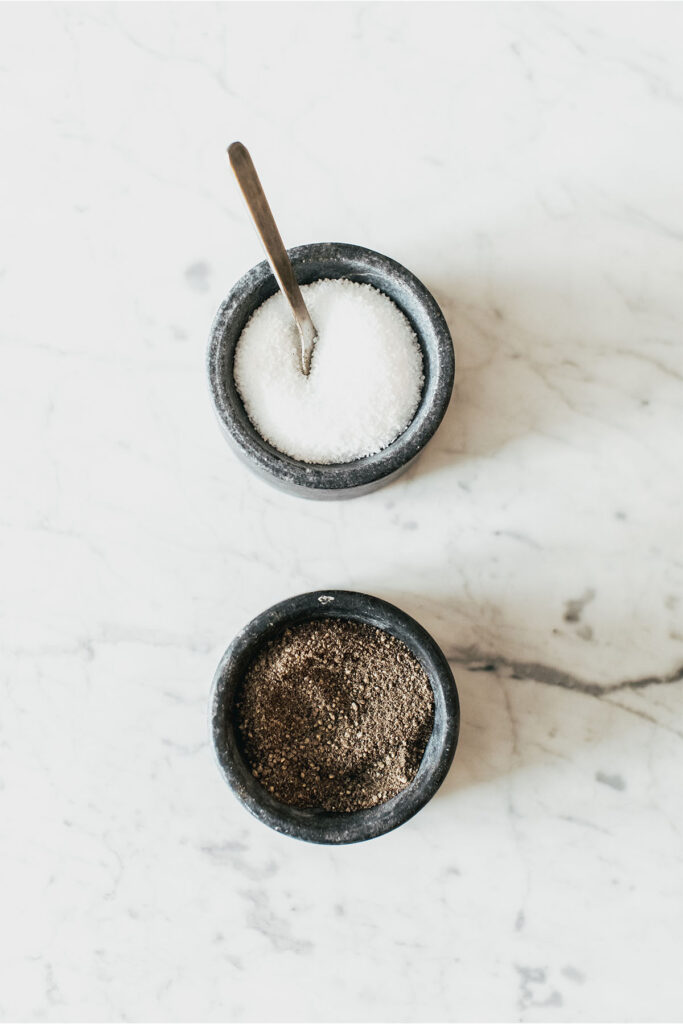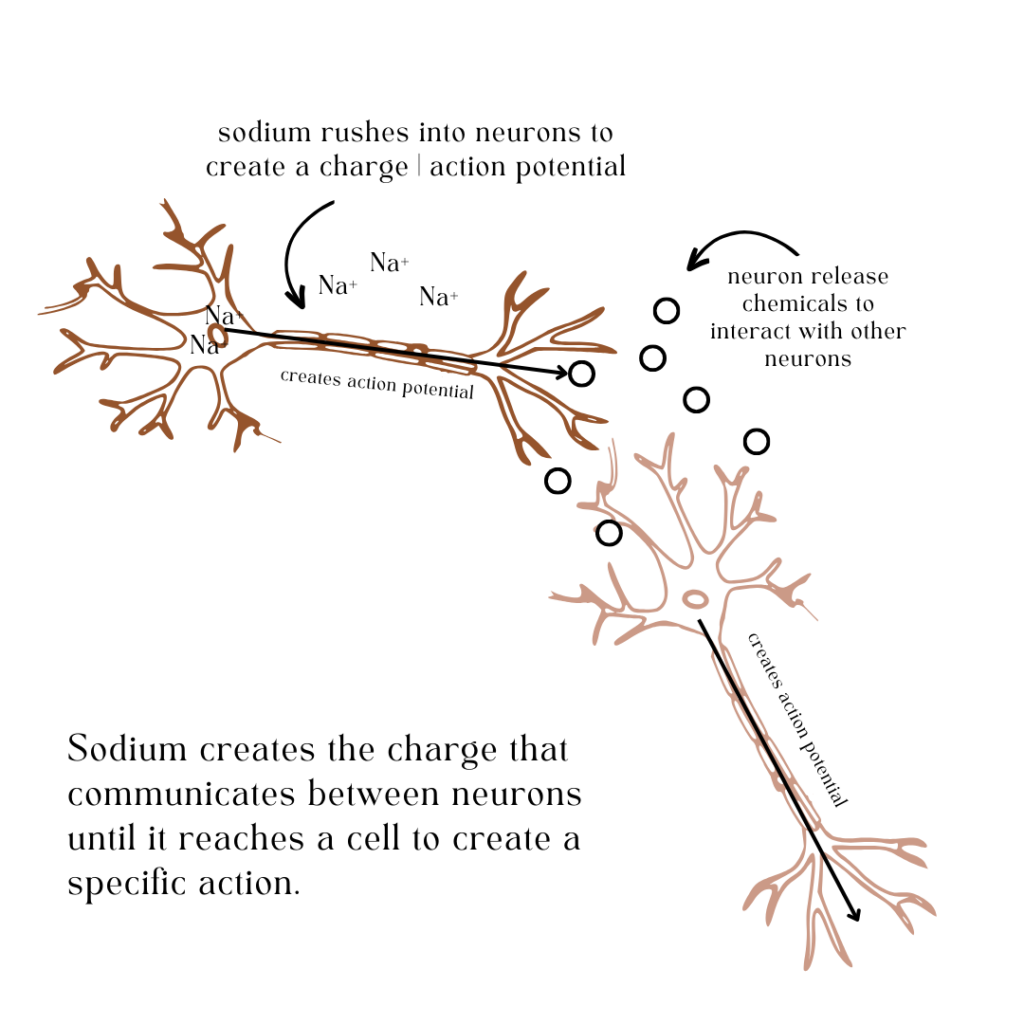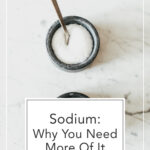
Sodium has gotten a bad rap in the health space. It has been a villain in health, making most people assume it’s bad for your health. Therefore, you should eat less. But as we’ve learned, as we so often do through restriction of certain nutrients, our lack of sodium hasn’t led to healthier lives.
Arguably, we are more unhealthy and out of balance partially due to the lack of salt in our diets.
In this post, I want to share the importance of sodium based on what it does in the body. But first, we have to answer the question as to why sodium has been deemed bad. To clear the old beliefs to make room for the truth.
The Salt-Myth
The common belief that sodium is bad for your health came from a research study released in the early 1960’s. The study was published by Lewis Dahl who found that a high-sodium diet was linked to heart problems like high blood pressure and reduced longevity.
While the study has some apparent flaws, I believe the reason this study gained so much attention was because of how common salt was in society.
Salt has historically been a vital ingredient in survival. It acts as a great preserving agent, especially for the parts of history where refrigeration was impossible. Not to mention, it is one of the most common and best flavoring agents in food. Nearly every single recipe uses salt for function and flavor.
Therefore, releasing a study publishing results that found salt harmful was most likely shocking and terrifying—creating an epidemic of fear.
But if you dive into the study, you will quickly realize a few resounding flaws.
For the sake of clarity, the amount of sodium administered in the study was 150 times the regular human equivalent dose. The study completely ignored that, realistically, the level of sodium used was nowhere near the level people consumed daily.
The amount consumed in the study was elevated to a degree that became unhealthy. As we know, this can happen with nearly any good substance, including water. Too much of anything can turn bad.
Over time, this sodium myth has become the foundation of the ‘salt-scare.’ Leading both directly and indirectly to the development of sodium deficiencies, which are wide-reaching and detrimental to your entire health, including your metabolism.
Why You Need Sodium
Sodium is considered one of the most critical minerals of the body. It is not something your body produces but regulates based on what you consume. Because of this, it becomes vital that you consume it.
Sodium works in tandem with another element, potassium, to act as a chemical battery that powers our nerve impulses and muscle contractions. It is the fuel that allows neurons to function and communicate.
Essentially, sodium is the communication network of our entire nervous system. Without it, researchers have found the nervous system can become more quickly dysregulated, leaving you reacting to smaller stress with greater energy.
Little things become big things. Uncomfort can turn into full-fled anxiety. Not because it is but because your nerve impulses are lacking fuel. This lack of support can also leave you struggling with brain fog, lethargy, muscle weakness, anxiety, depression, memory loss, and even metabolic dysfunction.
Sodium is required for healthy nervous system function.
How Sodium Triggers the Nervous System
Sodium acts as an electrical charge, creating an action potential that reacts with other neurons. It’s the fuel to the fire of this delicate communication channel.
Picture it this way. Each neuron cell has an inside and outside. Inside the cell contains genetic material, potassium, and other nutrients needed for cell health and electrical firing. The inside carries a negative charge.
Outside the cell, you have sodium, which carries a heavy positive charge.

Like all electrical impulses, they fight to create balance in the charge, leaving the positive charge to flood the negative. In the case of neurons, this leaves the positive-heavy sodium ions flooding inside the negatively charged internal structure of the neuron.
The positive charge reacts with the negative charge, sending a wave of electricity through a wire-like function called the axon that releases little packets of chemicals to excite or suppress an action potential in surrounding neurons. This becomes the communication channel that runs from neuron to neuron until it arrives at the appropriate destination to create an action.
Once the action occurs, the cells return to their neutral (negatively charged state) by pushing sodium back out of the neuron through the sodium-potassium pump. In the process, it prepares for another round of stimulation.
Because of sodium, the cell reacts, creates the charge, sends the signal, and influences other cells to respond accordingly. Perhaps it is better said you generate an action because of sodium.
Without it, your nervous system wouldn’t fire appropriately, leaving you fighting through a sluggish bout of symptoms and, over time, disease.
Your Body’s Back-Up Plan
Sodium is so crucial to your body that it has several systems to regulate it. Even though there are very few stored forms of sodium inside the body, it has a sensitive set of systems in place to ensure you have adequate amounts available to complete vital functions.
When the body senses a lack, it ignites processes to protect it. The kidneys are the primary system regulating sodium and fluid balance. When they sense this lack, your kidneys pull it from the urine rather than excreting it.
At the same time, this stimulates the adrenals (which sit on top of the kidneys) to produce glucocorticoids to regulate fluid balance. The release of this hormone stimulates a rise in blood pressure, again to protect the body.
Of course, over time, we know this causes significant damage to the body. But it’s worth noting that high blood pressure happens through a lack of dietary sodium that leads the body to begin preserving and uncovering it. Instead of releasing excess fluid, it holds onto it to hold onto it.
At the same time as pulling fluid, glucocorticoids act on the brain to change the tolerance of salty substances, leading many people to crave salt (and sometimes sugar). If you pay attention to your body, you can recognize, based on what you crave, where you have deficiencies in your diet.
This is also the function of how sodium interacts with your metabolism, slowing down your energy and metabolism to make up for the lack of energy due to the lack of sodium.
That means increasing sodium concentration increases energy inside the body, creating fuel for healing, thriving, and living. All of that to say, you need adequate amounts of sodium in your diet to feel energized and thrive.
Let’s clear the air about Salt and High Blood Pressure
Salt alone is not to blame for conditions such as high blood pressure, at least in most people. Like all things, issues arise from an imbalance in nutrients, pushing the body outside its homeostatic needs. Overeating sodium is equivalent to eating too little. Both extremes ignite problems.
But when it comes to high blood pressure, sodium is generally only detrimental when combined with lots of junk food and a sedentary life. It’s overall poor lifestyle choices that bring the harmful effects of it.
To clear the air, here are a few points to note:
- Sodium intake is just one aspect of a larger picture of poor health
- Salt sensitivity is often a result of other underlying conditions
- Bad lifestyle choices are often the main reason for conditions associated with high sodium intake.
- Adequate sodium is critical to better health.
A more recent research study found that people who consumed less than the recommended sodium had a 19% higher risk of dangerous heart-related events.
The study looked at 28,000 patients with heart disease who were deemed high-risk. Researchers found that consuming between 4 and 6 grams of sodium presented as the lowest-risk scenario for cardiovascular events.
But, like all things, it’s always about balance.
How much sodium do you need?
How much you need is hard to pinpoint precisely partially because your unique body is different from the next. But also because your sodium intake depends on your environment and what your body is working to heal. When sweating or pulling more fluids from your body (such as cold conditions or stress), you will need more than sitting in a climate-controlled office all day.
Similarly, a woman in different menstrual cycle phases will also shift sodium requirements. Many women may note they crave more salt as they near the menstrual phase of their cycle because they need more sodium to balance higher estrogen. Therefore, you should eat more during this time.
But generally speaking, you should consume more than the recommended daily allowance. Add more than the recommended 2300 milligrams to start. Then listen to your body. If you find yourself craving salty snacks, consume more.
Likewise, if you’re always thirsty, it could be because you’re not consuming enough sodium.
Of course, not all sodium is created equal. Processed foods have an abnormally large amount of sodium that can trick the brain, leading to artificial cravings and even salt addictions. But in real foods, and especially amongst people on diets like keto, you are not absorbing or maintaining the sodium intake that happens with carbohydrate consumption.
If you are this person, you need to consume more sodium.
The same goes for people who practice intermittent fasting or those who consume a lot of caffeine. Caffeine is a diuretic, like alcohol, pulling water from the system, leading to a lack of intracellular sodium. If you fall into these categories, add more sodium to your diet or consider using a salt supplement.
Realistic Tips To Get More Sodium In Your Diet
It’s not difficult to get more sodium. Cook with it, add a pinch to your water, or even supplement with it. The main goal is to stop avoiding it and start using it.
Here are a few tips to get more in your diet.
01: Season Your Food With It
Many people fear adding salt to homemade foods because of the salt phobia that has rocked the health space. Again, I’m not asking you to pour on the salt, but adding a pinch here or there to flavor your food can give you the balanced boost your body needs. Plus, you’ll take bland foods and make them flavorful. This alone can change the brain chemistry, increasing your satiety.
02. Add A Pinch To Your Drinks
We tend to neglect the difference between fluid consumption and hydration. The two are not the same thing. Fluid, without electrolytes, can not benefit the inner parts of your cell. Without electrolytes, you feel bloated and inflamed. You may also find yourself urinating in excess amounts.
Instead of adding up how much you’ve had to drink, focus on the quality. Increase absorption and leave yourself hydrated by adding a pinch of sea salt to your beverages. I promise it will leave you feeling refreshed.
03. Supplement With It
Electrolyte drinks are all the rage. Some can even be a great source of sodium. They are popular because we want to feel our best. However, many electrolyte drinks contain unhealthy ingredients that nix the benefits of minerals like sodium. Skip the high-sugar, ultra-processed drinks and add a natural supplement focused on quality ingredients and a healthy ratio of minerals.
My go-to is LMNT. It has single-handily become a part of my daily nutrient intake. Learn more and try it out using this link to get ten free sample packs. Get an inside look at the changes I’ve noticed since implementing more sodium here.
